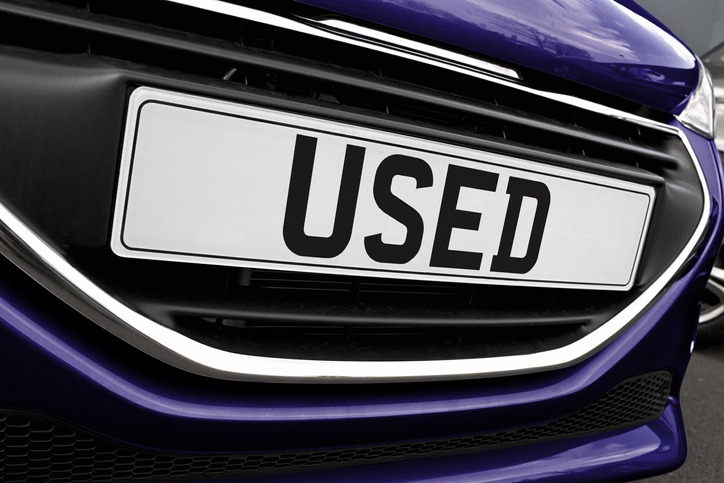October improvement in UK new-car market belies challenging environment
04 November 2021

The UK new-car market enjoyed a modest recovery in October, yet there are new challenges ahead in the form of rising inflation and weakening consumer confidence. Autovista24 senior data journalist Neil King explores the latest figures and factors.
In total, 106,265 new cars were registered in the UK last month, according to data released by the Society of Motor Manufacturers and Traders (SMMT). This is 32.2% lower than the 10-year monthly average (between 2010 and 2019) of almost 157,000 registrations. Furthermore, the SMMT reports that ‘the overall market’s monthly performance was the weakest seen since October 1991.’
As UK dealers endured lockdowns and subsequent releases of pent-up demand, year-on-year comparisons with 2020 are meaningless. Therefore, comparisons are made against 2019, which better represent the true performance of the country’s new-car market.
The 25.8% contraction last month marks a reasonable improvement on the 37.3% decline in September. Moreover, there were two fewer working days in October this year than in 2019 and, on an adjusted basis, Autovista24 calculates that the market fell by 18.8% compared to the adjusted 40.1% fall in September. Nevertheless, this does not point to a broad-based recovery in the near future.
‘The current performance reflects the challenging supply constraints, with the industry battling against semiconductor shortages and increasingly strong economic headwinds as inflation rises, taxes increase and consumer confidence has weakened,’ said SMMT chief executive Mike Hawes.
Weaker outlook
In the first 10 months of this year, the UK new-car market contracted by 29.1% compared to the same period in 2019.
In addition to supply constraints, which are expected to persist into 2022 and possibly beyond, there is mounting pressure on household budgets, including higher energy costs and record fuel prices. Interest rates are expected to rise too, although they were held at 0.1% in the November meeting of the monetary policy committee (MPC). Therefore, consumer confidence and the economic outlook are likely to weaken further.
Given the challenging environment, Autovista24 has downgraded its 2021 forecast to 1.67 million new-car registrations, equating to 2.7% year-on-year growth and a fall of 27.5% against two years ago.
Similarly, in its latest quarterly forecast update, the SMMT predicts 1.66 million registrations in 2021 ‘in light of the ongoing supply issues and deteriorating economic outlook.’ This marks a significant downward revision to the association’s July forecast of 1.82 million and ‘would see 2021 finish 1.9% or some 30,000 units up on 2020, but some 650,000 units down on 2019’s pre-pandemic 2.3 million performance,’ the association emphasised.
Buoyant EV uptake
Despite semiconductor shortages, registrations of electrically-chargeable vehicles (EVs) remain buoyant. The combined 23.1% share of EVs in October was more than double that of diesel cars, including mild-hybrid diesels, which gained 10.8%.
‘Plug-in vehicle uptake remained positive in the month before COP26, with battery-electric vehicles (BEVs) equalling their September market share of 15.2% with 16,155 units, while plug-in hybrid vehicles (PHEVs) grew to 7.9% or 8,382 units,’ the SMMT noted.

In the first 10 months of 2021, BEVs and PHEVs captured 9.9% and 6.7% market share respectively. Combined, the 16.6% share of EVs exceeds the diesel share, 15.1%, and ‘when joined by a further 9.1% from hybrid-electric vehicles (HEVs) means that 25.7%, or more than a quarter of the new-car market, has been electrified year-to-date,’ the SMMT highlighted.
‘Electrified vehicles continue to buck the trend, with almost one in six new cars registered this year capable of zero-emission motoring, growth that is fundamental to the UK’s ability to hit its net-zero targets,’ Hawes commented. ‘With next year looking brighter, and even more new models expected, the continuation of this transition will depend on the preservation of incentives that overcome the affordability barrier, and the ability of the public and private sectors to increase public on-street charging to allay EV driver concerns.’
More EVs in 2021 than the last decade
A total of 271,962 EVs were registered in the UK between 2010 and 2019. ‘Uptake rates have accelerated so rapidly that more will join Britain’s roads in 2021 than during the whole of the last decade,’ according to a new forecast from the SMMT.
‘As the UK hosts the COP26 environmental summit, the SMMT now expects Britain to break its plug-in records, forecasting that businesses and consumers will take up around 287,000 of the latest zero-emission capable cars during 2021 alone – around one in six new cars. Based on current forecasts, BEV registrations are also expected to exceed those of diesel by the end of 2022,’ the association explained.

It is clear that throughout the semiconductor crisis, which has dramatically impacted car production globally, manufacturers have sought to supply as many EVs as possible. This is essential for OEMs to meet their emissions targets in Europe, especially as this applies to every new car registered in 2021, as opposed to 95% in 2020.
However, maintaining and accelerating the uptake of EVs means encouraging more consumers to switch from fossil fuels. With the UK planning to end the sale of internal-combustion engine (ICE) cars in 2030, ‘this bold aim will require the continuation of purchase incentives to encourage those drivers currently unable or unwilling to make the transition to electrified motoring,’ the association asserted.
‘Even more significant, however, is the need for turbocharged investment by both the public and private sector into the essential public charging infrastructure required by a growing plug-in vehicle fleet,’ the SMMT concluded.



